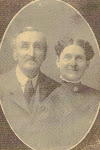The question should be what is Yellow Fever, since it still exists in certain parts of the world despite a vaccine. The "yellow" in yellow fever refers to the yellowing jaundice that infected people exhibit. Spread by mosquitoes it penetrates the lymphatic system, and ultimately attacks vital organs. To learn more about Yellow Fever in our modern world check out the Center for Disease Control's reference at http://www.cdc.gov/ncidod/dvbid/yellowfever/index.htm .
Yellow Fever, also referred to as Yellow Jack or Yellow Plague, had a profound affect on past generations. Naturally, it's prevalence in certain eras is often stumbled upon in genealogical research. Knowing where epidemics occurred and their severity can provide clues to our ancestors lives. In the early days of the United States, wherever mosquitoes flourished, Yellow Fever threatened to claim the lives of whole populations. The news of the spreading disease in cities sent many families in search of new and safer places to live. Just the name itself invoked so much fear that a small town on the east coast of Florida changed it's name from Yellow Bluffs to Ozona, after an outbreak during the late 1800s. According to Wikipedia http://en.wikipedia.org/wiki/Yellow_fever, in 1878, over 20,000 people in the Mississippi valley died as a result of a yellow fever epidemic.
For many of our ancestors the fear was warranted. Although, not all who acquired the disease died, those who did succumb suffered a tormented death. According to an antique medical book from about 1900 in my possession, titled Manual of Tropical Medicine; high fever, hemorrhages, seizures, severe muscle pain, delirium, and violent "black" vomiting are just a partial list of symptoms.
By the time the above mentioned Manual of Tropical Medicine was in circulation, scientists and physicians had pinpointed the origins of Yellow Fever to the mosquito. Efforts were made to control mosquito populations in the U.S. and the disease was contained. America endured it's last epidemic in New Orleans in1905.
PBS has a very informative website and film on the subject titled The Great Fever http://www.pbs.org/wgbh/amex/fever/index.html. I also found this website that has a glossary of useful genealogical terms including epidemics http://www.genealogy-quest.com/index.html.
Subscribe to:
Post Comments (Atom)








No comments:
Post a Comment